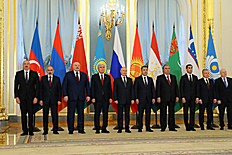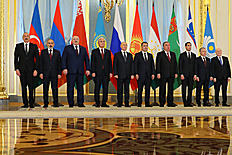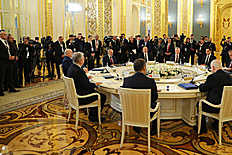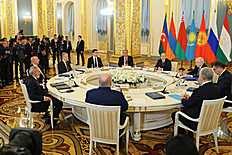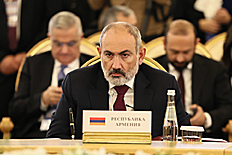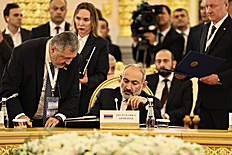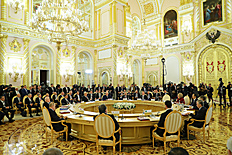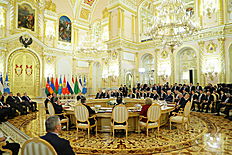Press releases
The Republic of Armenia is ready to fully ensure the safety of traffic of goods, vehicles and people through its territory. Nikol Pashinyan
more 5 photos
Prime Minister Nikol Pashinyan participated in the regular session of the CIS Council of Heads of State in Moscow. First, ther leaders posed for a family photo, then narrow and extended-format meetings took place.
Prime Minister Nikol Pashinyan made a speech in the narrow-format session, in which he specifically stated:
"Dear Heads of State,
Dear colleagues,
I am glad to see you at the regular session of the CIS Council of Heads of State.
First of all, I would like to thank the Russian side and the President of the Russian Federation for the hospitality and for organizing the current session at the highest level.
Today's meeting is a good opportunity to exchange opinions on current issues of the development of the situation in the CIS.
In this context, from the perspective of Armenia I would like to inform you the current situation in the peace process between the Republic of Armenia and the Republic of Azerbaijan and Yerevan's vision for further development.
The Government of the Republic of Armenia is firmly committed to the early establishment of peace in the South Caucasus and bringing the region to the path of stable and predictable development, taking into account the interests of all the countries of the region.
This year, we have made tangible progress in the process of demarcation of the Armenian-Azerbaijani state border, and in particular, on the basis of the 1991 Alma-Ata declaration, border demarcation was carried out in three sections of the border between the Republic of Armenia and the Republic of Azerbaijan, and in those sections the inter-republican administrative border of the Soviet period has already been reproduced as a demarcated interstate border. This is undoubtedly an example of success.
Another important event took place on August 30 of this year, when the regulation on the joint activity of the commissions on the demarcation of the state border between the Republic of Armenia and the Republic of Azerbaijan was signed.
In Armenia, the process of internal state procedures for the adoption of this document is coming to end, and during this month the Armenian parliament will discuss the issue of ratification of this document. It is important to note that the Constitutional Court of the Republic of Armenia has already confirmed the compliance of the signed regulation with the Constitution of the Republic of Armenia, which means that the recognition of the territorial integrity of the Republic of Azerbaijan by the Government of the Republic of Armenia on the basis of the Alma-Ata Declaration, which implies the entire territory of Soviet Azerbaijan, is in line with the Constitution, which in turn means that there are no territorial claims to Azerbaijan or any other country in the Constitution of Armenia.
Dear colleagues,
We hold the firm conviction that peace between Armenia and Azerbaijan is not only possible, but also within reach.
Both Armenia and Azerbaijan have announced in recent months that the draft agreement "On the establishment of peace and interstate relations between the Republic of Armenia and the Republic of Azerbaijan" has been agreed upon by at least 80 percent. Recently, in the level of the foreign ministers of Armenia and Azerbaijan, an agreement was reached to activate the work towards the completion of the approval of the draft peace treaty.
In principle, we can act according to the following logic, which is what we propose to Azerbaijan: to sign what has already been agreed, thus having not only de facto, but also de jure peace, and continue working on all other issues. In any case, it is impossible to develop such a peace treaty that will answer all questions and regulate all aspects of bilateral relations. Whatever the peace treaty between Armenia and Azerbaijan is, there will inevitably remain important, fundamental issues that must be agreed upon, resolved, and new treaties must be signed.
Moreover, in the presence of a signed and ratified peace agreement, the solution of other issues will be much easier, because a completely different situation will prevail in the region.
And at this stage, we have to make a decision on a number of fundamental issues that can become a solid basis for the establishment of peace between our countries. It is about mutual recognition of each other's territorial integrity. I am talking about the obligation to confirm the absence of territorial claims towards each other and not to present such claims in the future. I am talking about maintaining the principle of non-use of force and threat of force, non-interference in each other's internal affairs, establishment of diplomatic relations and creation of bilateral mechanisms for the fulfillment of obligations assumed by the parties within the framework of the peace treaty.
The wording of all these issues has already been agreed by the parties in the draft agreement "On establishment of peace and interstate relations between the Republic of Armenia and the Republic of Azerbaijan", and we are ready to sign this document already this month, and this is our official position.
Dear Heads of State,
Another important aspect of establishing stability in the South Caucasus is the issue of unblocking all transport and economic connections. In this matter, we offer concrete solutions, which are reflected in the "Crossroads of Peace" project developed by us. The essence of this project is as follows: Armenia is ready to ensure the passage of vehicles, cargo, passengers, pipelines, cables through its territory: from Georgia to Iran and vice versa, from Turkey to Azerbaijan and vice versa, etc. We are ready to ensure the passage of vehicles, cargo, passengers, pipelines, cables between the main part of Azerbaijan and the Autonomous Republic of Nakhichevan.
Responding to our proposals, Azerbaijan emphasizes that if Armenia does not want to open regional communications, Azerbaijan will use the opportunities provided by the Islamic Republic of Iran to connect with Nakhichevan. Of course, we do not object, because this is a matter of relations between the two sovereign countries. But I want to emphasize once again that Armenia wants the opening of regional channels and that we are ready to provide transport communications through our territory on the same terms as provided by the Islamic Republic of Iran. Moreover, we are ready to make certain simplifications in border control procedures within the framework of respect for the principles of reciprocity, equality, sovereignty and jurisdiction of the parties.
In this context, I emphasize that the Republic of Armenia is ready to fully ensure the safety of passage of goods, vehicles and people through its territory. This is our desire, our commitment, and we guarantee it. By the way, all statements that Armenia has somehow agreed that third countries will ensure the security of communication in its sovereign territory, or that this is stipulated by some document, are simply not true. Ensuring security in its territory is the sovereign obligation of any country. That's our job, and we guarantee to do it.
Concluding my speech, I would like to congratulate our Tajik friends on accepting the presidency of the CIS in 2025 and express the permanent disposition of the Armenian side to make all necessary efforts to bring to life the mutually beneficial priority programs of the presidency of the Republic of Tajikistan in the CIS. Thank you for your attention."
Next, in the extended session, the leaders of the countries signed the protocols of the issues approved by the agenda. In particular, issues related to the development of cooperation within the framework of the CIS were discussed. Among other issues, a decision was made to recognize the city of Meghri in Armenia as the Cultural Capital of the CIS in 2026.
